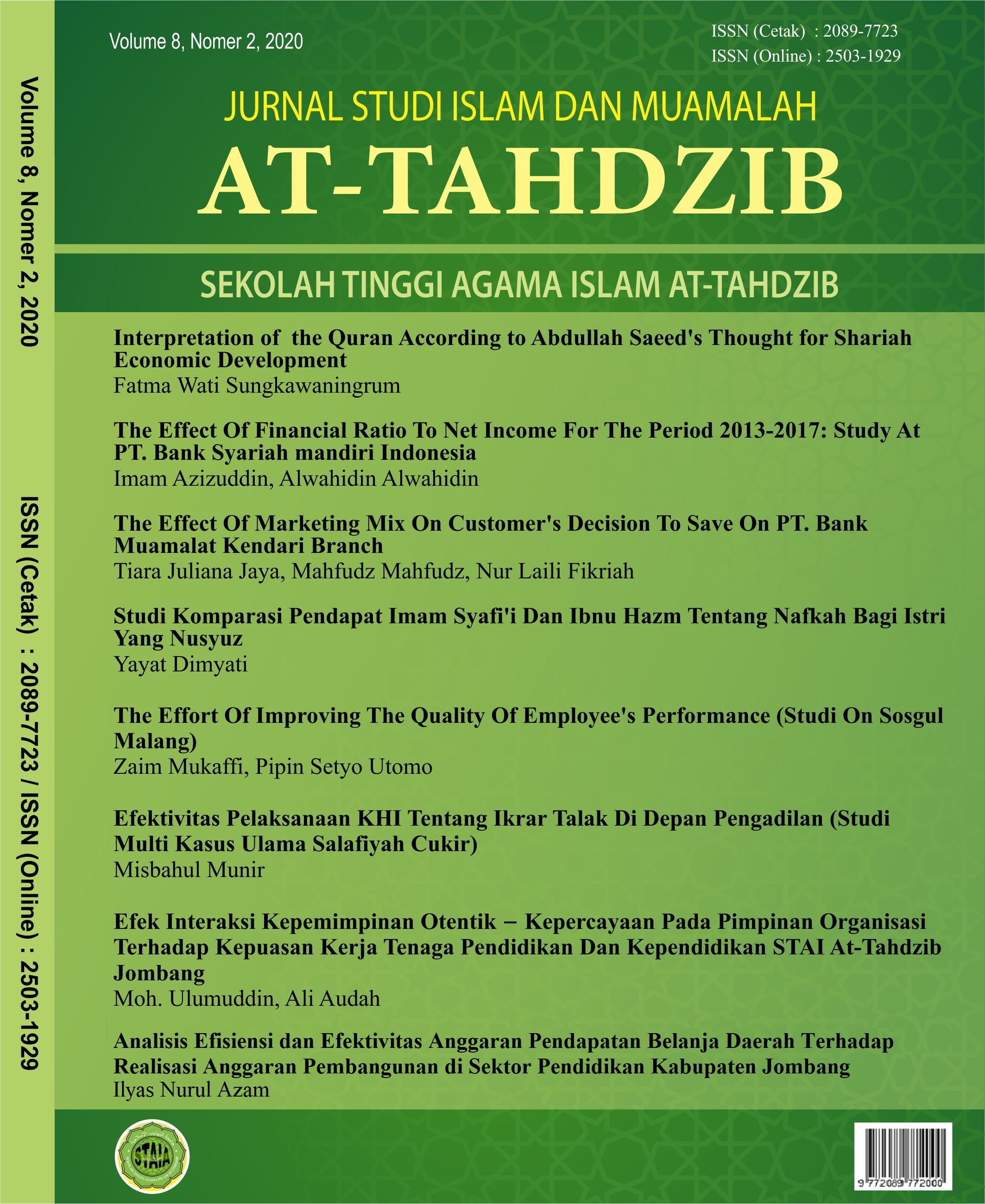Studi Komparasi Pendapat Imam Syafi’i Dan Ibnu Hazm Tentang Nafkah Bagi Istri Yang Nusyuz
Abstract
Making a living is one of the important things in domestic life. Therefore, rules relating to livelihood problems need to be studied. But in this livelihood problem there is a difference of opinion between Imam Shafi'i and Ibn Hazm regarding the matter of livelihood for an elderly wife. The purpose of the nushuz is the attitude of defiance or dishonesty of the wife towards her husband. The verses of the Qur'an which explain explicitly and clearly about the failure or failure of living for an incompetent wife do not exist. However, the two Imams above have their respective arguments in punishing the matter. Based on this the authors are interested in expressing differences of opinion between the two Imams above.
The results of this study are: Imam Shafi'i argues that if the wife of Hussein then his right to earn a living will be killed, unless the wife has returned from his Hussein. While Ibn Hazm argues that whether a wife is nushuz or not, he will still earn a living.
This research can be concluded that the difference of opinion between the two priests above is caused by differences in the methods and legal basis used as a basis in establishing the law of a problem by the two priests. Imam Shafi'i in stipulating the law regarding the above problem is based on ijma 'jumhur ulama which states that nushuz is one of the reasons that can make a living. Whereas Ibn Hazm is based on the meaning of Dhahr from al-Qur'an's an-Nisa verse 34 and the Prophet's Hadith narrated by Muslims. Therefore, the authors suggest that husband and wife must truly understand their rights and obligations towards their partners, so as to create a peaceful and peaceful home life.
References
Al-Qur’an dan Terjemahnya. Departemen Agama RI
Abu Bakar, Taqiyuddin , Kifayatul Akhyar, terj. Syarifuddin Anwar dan Misbah Musthafa, Surabaya: Bina Iman, 1996
Al Hamdani, H.S.A, Risalah Nikah: Hukum Perkawinan Islam, terj. Agus Salim, Jakarta: Pustaka Amani, 2002.
Al-Jaziri, Abdurrahman, Fiqh ‘Ala Madzahib al-Arba’ah Juz IV, Beirut Libanon: Daar al-Kutub al-Ilmiyyah, tt
Al-Mawardi, Abi al-Hasan Ali bin Muhammad bin Habib, al-Hawi al-Kabir, Beirut Libanon: Daar al-Fikr, 2003
An-Nawawi, Abi Zakaria Yahya bin Syarif, Shohih Muslim Bi Syarh An-Nawawi, Jilid IV, Kairo: Dar Al-Ghad Al-Jadiid, 2008
Asy- Syafi’i, Muhammad bin Idris, Al Umm, Beirut: Daar al Fikr, t,th.
Ash-Shan’any, Muhammad bin Ismail, Subulus Salam, Juz III, Bairut Libanon: Daar al-Kutub al-Ilmiah, t.th.
Asy-Syajastani, Abi Daud Sulaiman ibn as-Yas Sunan Abi Daud, Beirut: Dar al-Fikr, 1994.
Az Zuhaili, Wahbah, al-Fiqh al-Islamy wa Adillatuhu, Juz VII, Beirut: Daar al-Fikr,tt.
Hasyim, Syafiq, Hal-Hal yang Tak Terpikirkan Tentang Isu-Isu Keperempuanan dalam Islam Bandung: Mizan, 2001.
Hazm, Ibnu, Al-muhalla, Beirut: Daar al-Fikr.
Rofiq, Ahmad, Hukum Islam Di Indonesia, Jakarta: PT Raja Grafindo Persada, 2003.
Sabiq, Sayyid, Fiqih Sunnah, Beirut: Daar al-Fath, t.th.
Salim, Abu Malik Kamal ibn as-Sayyid, Fikih Sunnah Wanita, Jakarta: Qisthi Press, 2014.
Salim, Abdul Muhammad, Risalah Nikah (Penuntun Perkawinan), Surabaya: Bintang Terang, tt.
Syarifuddin, Amir, Hukum Perkawinan Islam di Indonesia, Jakarta: Kencana, 2006.
Tihami, H.M.A. dan Sohari Sahrani, Fikih Munakahat: Kajian Fikih Nikah Lengkap, Jakarta: Rajawali Pers, 2010.
Umar Sitanggal, Anshory, Fiqih Syafi’i Sistimatis, Semarang: CV. ASY SYIFA’,1994.
Copyright (c) 2020 At-Tahdzib: Jurnal Studi Islam dan Muamalah

This work is licensed under a Creative Commons Attribution 4.0 International License.

Jurnal Studi Islam by At-Tahdzib is licensed under a Creative Commons Attribution 4.0 International License.
Based on a work at http://ejournal.kopertais4.or.id/mataraman/index.php/tahdzib





